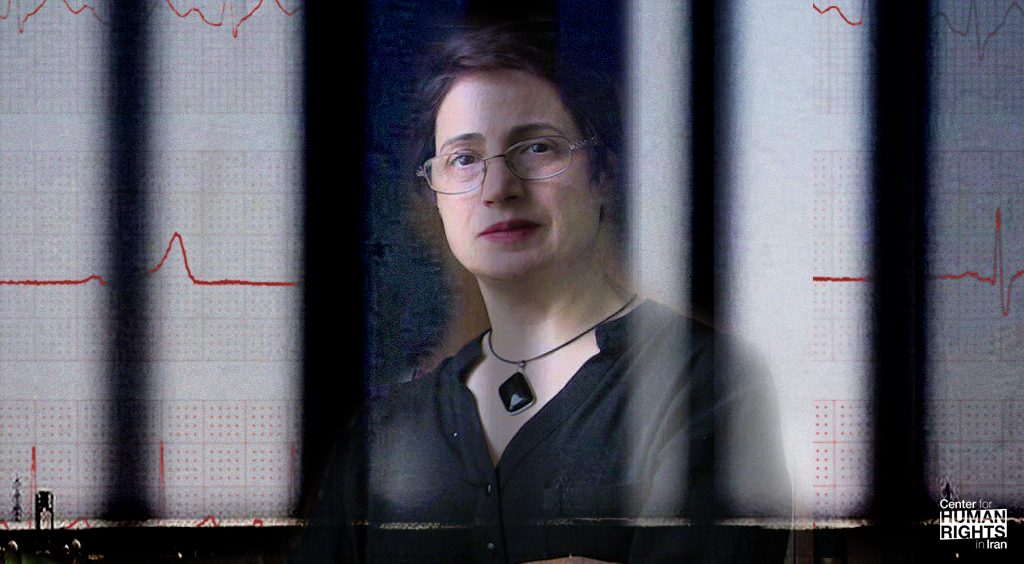Nasrin Sotoudeh Transferred to Notorious Gharchak Prison

Doctors Say Hospitalization Required, Instead Sotoudeh Moved to Iran’s Most Dangerous Prison
Human Rights Lawyer’s Health in Serious Danger
October 20, 2020 — Nasrin Sotoudeh, the imprisoned human rights attorney, has been moved to the notoriously harsh Gharchak Prison (also spelled Qarchak) in the Iranian city of Varamin, south of Tehran, despite grave medical issues that require her hospitalization, her husband, Reza Khandan said today, October 20, 2020.
Sotoudeh, who has serious cardiac and pulmonary complications after being on a hunger strike from August 11 to September 26, 2020 to protest the continued imprisonment of Iran’s political prisoners, will now continue serving her 38-year sentence (12 years of which she must serve before becoming eligible for release) at one of Iran’s most dangerous and inhumane prisons.
In an interview with CHRI on October 20, 2020, Reza Khandan, Sotoudeh’s husband, stated: “When Nasrin’s heart condition became worse, she needed an angiography. We have been waiting these past few days to prepare for her transfer to the hospital [from Evin Prison]. Today the authorities told her to get ready to go to the hospital but then she ended up in Gharchak Prison. The transfer was not announced by the prison authorities but by Nasrin herself who was allowed to make a brief phone call to give the news.”
“By denying Nasrin Sotoudeh critically needed medical care, and instead moving her to Gharchak Prison, known for its horrific conditions, the authorities in Iran are placing Nasrin Sotoudeh’s life in immediate danger,” said Hadi Ghaemi, executive director of the Center for Human Rights in Iran (CHRI).
“Sending Sotoudeh to sit behind bars alongside common criminals in conditions much more dangerous than Evin Prison is a desperate and transparent attempt to punish her—and to risk her life if they cannot silence her and her family any other way,” Ghaemi added.
CHRI calls for the immediate transfer of Nasrin Sotoudeh to hospital where she can receive full and proper treatment with the consent of her family.
Husband: “The authorities used trickery and deceit to transfer a prisoner”
Khandan told CHRI: “The authorities used trickery and deceit to transfer a prisoner, even though there was no need to do so. Nasrin didn’t have any of her belongings with her since she had only prepared to go to the hospital. She does not have her warm clothes and given her heart condition, we’re very worried for her.
“These kinds of behaviors by the judicial authorities toward Nasrin is the continuation of a policy of pressure and intimidation against our family – from my daughter’s detention and continuing persecution, to stricter restrictions on Nasrin’s basic rights in prison.
“The reason for these harsh acts and pressures is Nasrin’s recent hunger strike and its impact in raising international awareness about Iran’s political prisoners. By resorting to deceit and trickery to transfer a prisoner, the judiciary has only added to its notoriety among the public.”
Prison Doctors “Shocked” at Sotoudeh’s Return to Prison
Sotoudeh was hospitalized on September 19 as her medical condition deteriorated—only to be sent back to Evin prison on September 23, despite her worsening condition.
On September 26, 2020, when Sotoudeh ended her hunger strike, Khandan relayed that the prison doctors were “shocked” that she had been returned to prison in her condition, and “strongly protested,” as during her hospitalization severe cardiac issues were identified.
Khandan also reported that during her hospitalization from September 19 to September 23, Sotoudeh was exposed to multiple guards who later tested positive for COVID-19. He stated that doctors outside the hospital who reviewed her tests consider her transfer back to prison as “a deliberate attempt to put her life in danger.”
Khandan also said on Facebook today, October 20, 2020 that “Three weeks ago, after being hospitalised, she was taken back to the prison before completing her full treatment. According to experts, she had to be transferred once again to the hospital for an urgent heart examination and angiography, but instead the Evin authorities have relocated her to Qarchak prison, where the healthcare and prison detention conditions are even worse than Evin prison.”
Nasrin Sotoudeh is in prison for her peaceful work defending basic civil and political rights in Iran. Among her charges were “encouraging prostitution” for advocating against compulsory hijab and defending citizens’ right to peaceful dissent.






